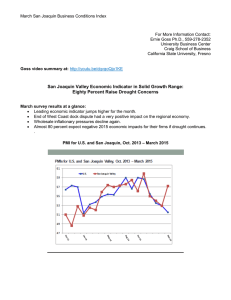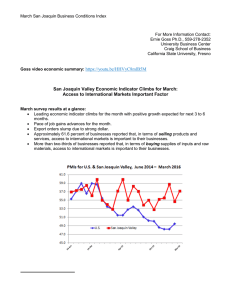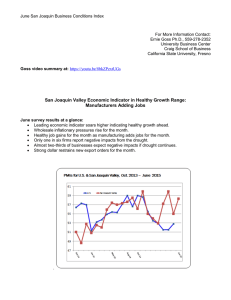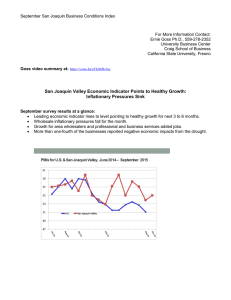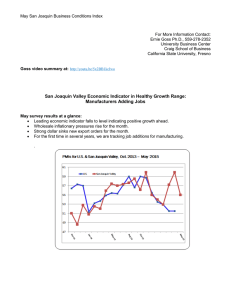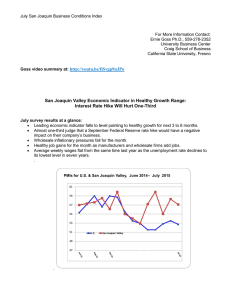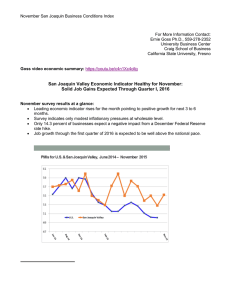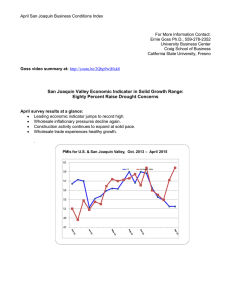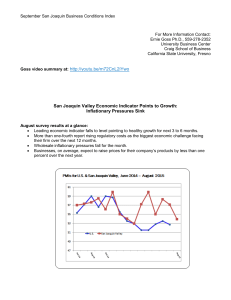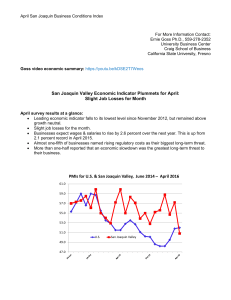Document 13092138
advertisement
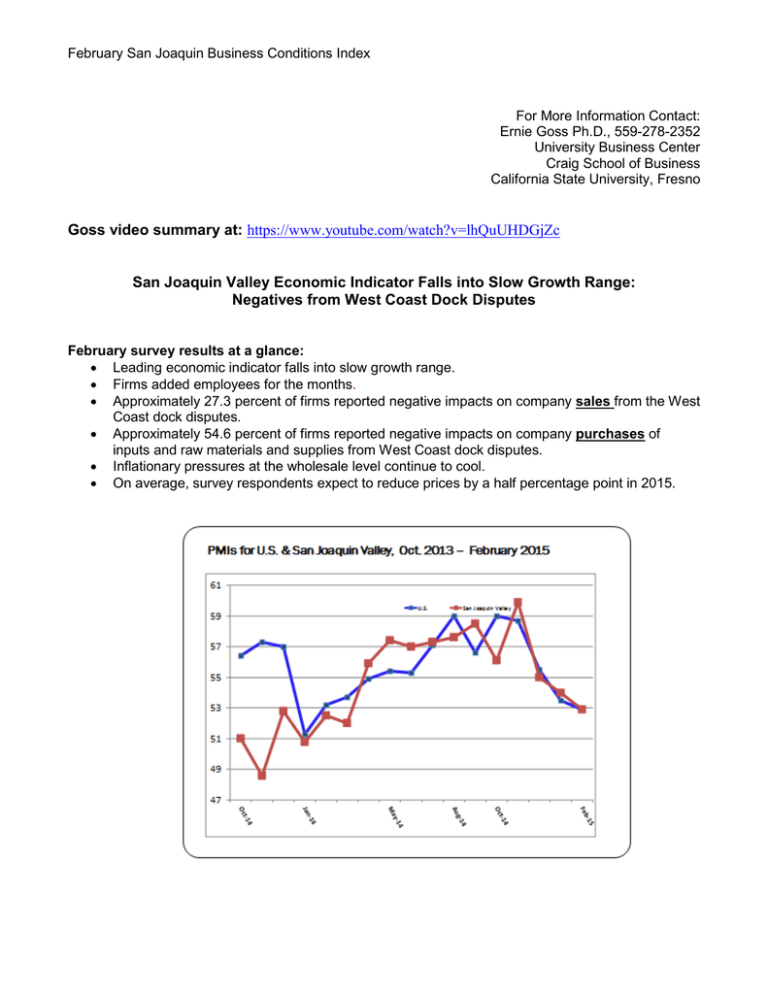
February San Joaquin Business Conditions Index For More Information Contact: Ernie Goss Ph.D., 559-278-2352 University Business Center Craig School of Business California State University, Fresno Goss video summary at: https://www.youtube.com/watch?v=lhQuUHDGjZc San Joaquin Valley Economic Indicator Falls into Slow Growth Range: Negatives from West Coast Dock Disputes February survey results at a glance: Leading economic indicator falls into slow growth range. Firms added employees for the months. Approximately 27.3 percent of firms reported negative impacts on company sales from the West Coast dock disputes. Approximately 54.6 percent of firms reported negative impacts on company purchases of inputs and raw materials and supplies from West Coast dock disputes. Inflationary pressures at the wholesale level continue to cool. On average, survey respondents expect to reduce prices by a half percentage point in 2015. San Joaquin Business Conditions Index – p. 2 of 4 For Immediate Release: March 2, 2015 FRESNO, CA-For the fifteenth consecutive month, the San Joaquin Valley Business Conditions Index rose above the 50.0 growth neutral threshold. The index, a leading economic indicator from a survey of individuals making company purchasing decisions for firms in the counties of Fresno, Kings, Madera, and Tulare, declined for the third straight month but continues to point to positive growth for the next 3 to 6 months. The index is produced using the same methodology as that of the national Institute for Supply Management (www.ism.ws). Overall Index: After climbing to a record high 59.9 in November, the overall index has moved lower for the last three months. However, the February index at 52.9, down from 54.0 in January, remains in a range indicating positive but slow growth in the months ahead. An index greater than 50.0 indicates an expansionary economy over the course of the next three to six months. Survey results for the last two months and one year ago are listed in the accompanying table. “Much like the national economy, the San Joaquin Valley economy is expanding at a solid pace. Based on our surveys over the past several months, that growth should remain positive for the next 3 to 6 months,” said Ernie Goss, Ph.D., research faculty with the Craig School of Business at California State University, Fresno. This month businesses in the area reported on the impact of the West Coast dock disputes. Approximately 27.3 percent of firms reported negative impacts on company sales from the West Coast dock disputes. Approximately 54.6 percent of firms reported negative impacts on company purchases of inputs and raw materials and supplies from West Coast dock disputes. Employment: After slumping below growth neutral in October of last year, the regional hiring gauge has moved above the 50.0 threshold. The employment index slipped to 51.1 from 52.3 in January. “Due to shipping issues tied to West Coast dock disputes, firms expanded employment at a much slower pace in February. The recent settlement of the dock labor issue will put the region back on a healthier employment growth path,” reported Goss. Wholesale Prices: The prices-paid index, which tracks the cost of purchased raw materials and supplies, slumped to 47.9 from 54.9 in January. “Just as in other regional surveys and the national survey, the San Joaquin Valley inflationary gauge signals declining inflationary pressures at the wholesale level. While I do not expect deflation, or declining wholesale prices, I do anticipate the inflation reading will trend lower in the months ahead, termed disinflation,” said Goss. Business Confidence: Looking ahead six months, economic optimism, captured by the business confidence index, sank to 54.8 from January’s much stronger 64.2 and from 64.1 in San Joaquin Business Conditions Index – p. 3 of 4 December. “Optimism from lower fuel prices more than offset economic pessimism stemming from global economic turmoil,” said Goss. Inventories: Businesses increased inventories of raw materials and supplies for the month and at a faster pace. The February inventory reading increased to 56.0 from last month’s 52.9. Trade: The new export order index soared to 66.8 from 41.9 in January, and the import index slumped to 40.9 from 44.3 in January. Other components: Other components of the February Business Conditions Index were: new orders at 45.6, down slightly from 45.7 in January; production or sales at 51.5, down from January’s 57.6; and delivery lead time at 60.4, down from 61.6 in January. Table 1 details survey results for February 2014, last month and February 2015. March survey results will be released on the first business day of next month, April 1. San Joaquin Business Conditions Index – p. 4 of 4 Table 1: Overall and component indices for last 2 months and one year ago (above 50.0 indicates expansion) San Joaquin Valley February 2014 January 2015 February 2015 Leading economic indicator 52.5 54.0 52.9 New orders 50.1 45.7 45.6 Production or sales 48.5 57.6 51.5 Employment 54.1 52.3 51.1 Inventories 52.8 52.9 56.0 Delivery lead time 57.1 61.6 60.4 Wholesale prices 71.9 54.9 47.9 Imports 58.1 44.3 40.9 Export orders 45.1 41.9 66.8 Business confidence 48.0 64.2 54.8 Craig School of Business: http://www.fresnostate.edu/craig/ubc/sjvs.html Follow Goss: Twitter at http://twitter.com/erniegoss or www.ernestgoss.com Blog: http://economictrends.blogspot.com
